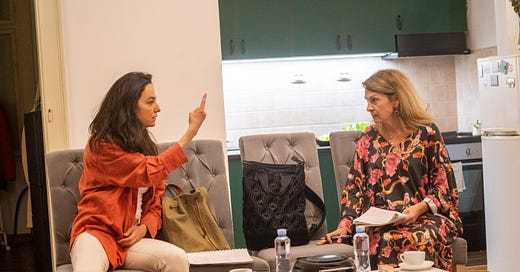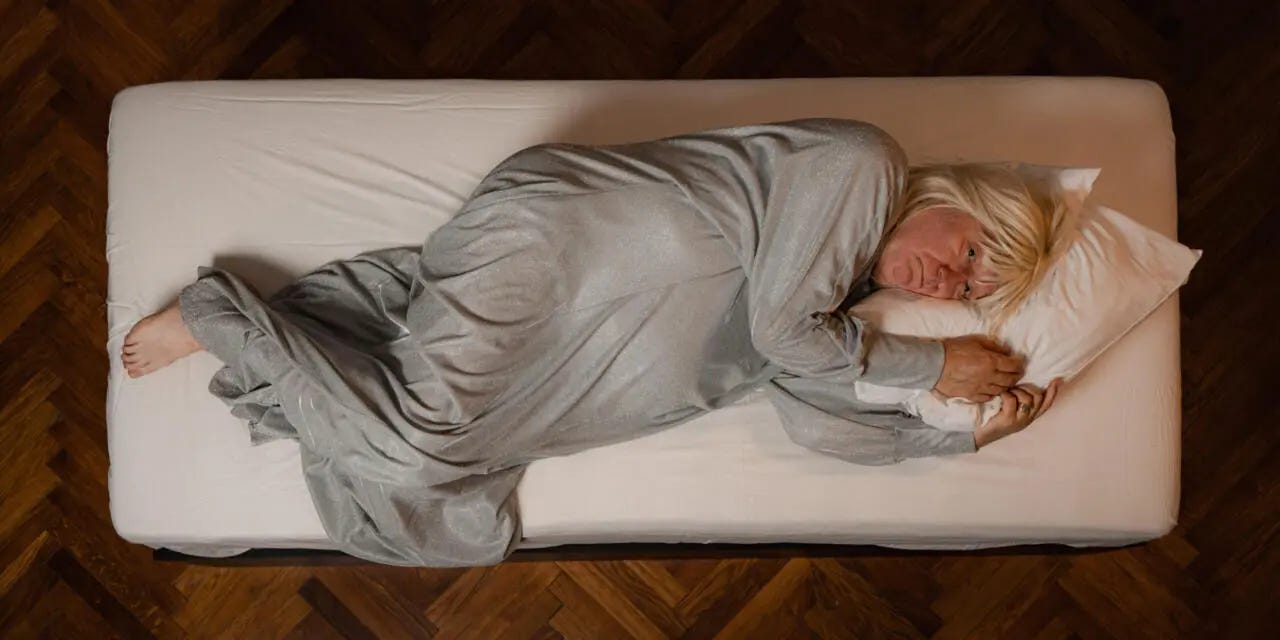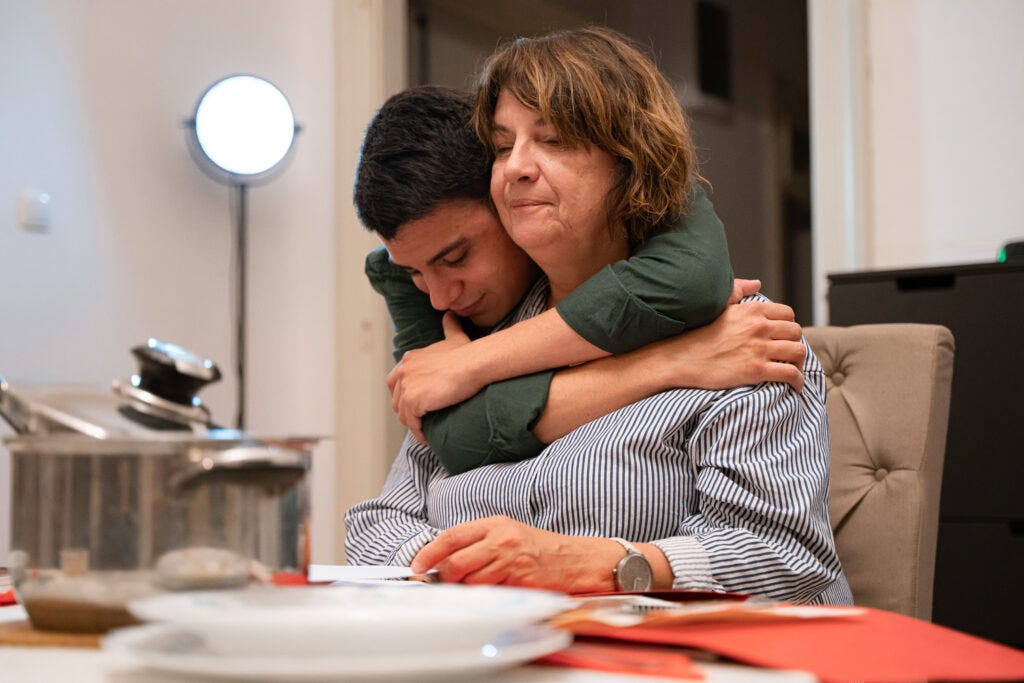An invitation: Heartefact, the Serbian theatre company confronting the past through art
A look at Heartefact, the Serbian cultural organisation doing vital work building cultural co-operation in the western Balkans and beyond.
Welcome to Café Europa, a weekly newsletter dedicated to European theatre.
This week we’re in Serbia, to look at touring theatre company and cultural NGO. Heartefact, who have been fusing art with activism for the best part of 15 years and have turned an apartment in the centre of Belgrade into an intimate performance space.
I also wrote about the Fast Forward festival in Dresden (see last week’s edition) and the support it affords young directors for The Stage and about Another Route, a new artistic fellowship designed to allow artists from the UK to internationalise their creative practice.
If you enjoy reading this newsletter, then please consider sharing it with friends or colleagues or, you know, anyone who might find it useful. Please also consider becoming a paid supporter, as it really makes a difference and will allow me to expand my coverage. As is the way these days, I also have a Ko-fi account, if you want to keep me caffeinated during all the many bus journeys I’ve taken of late. I want to keep as much of the content free as possible, so all donations are very welcome.
It’s an easy doorway to walk past. Topped with a grand stone crest, the wrought iron frontage slashed with graffiti, the entrance to this historic building in the heart of Belgrade’s old town gives no clue as to what lies inside. But come evening, audiences gather in the entrance hall before being led up to the second floor, to an airy apartment that for the last year and a half has doubled as the performance space for the Serbian theatre company and cultural NGO Heartefact.
I’m here to see The Finger, the longest running production in Heartefact’s repertoire. Written by Kosovar playwright Doruntina Basha and first performed in 2012, it’s a two-hander about two women, a mother and daughter-in-law, linked together by fate. In some Kosvovar households, the wives of those who went missing during the war still live with their husband’s family. The younger woman’s husband went into the garden one morning and never returned and now the two women remain in kind of Beckettian state, obliged to live together by custom, co-habiting with ghosts, unable to move on. They bicker and spar over small things, like the son’s preference for parsley, their relationship shaped by absence, by the men no longer with them. Their resentment is rooted in a shared pain; one has lost a husband, the other the son she would have given her life to protect. Though no body has ever been recovered, they know deep down he is never coming back and yet they remain tethered together.
The intimate nature of the space gives the play an extra power. The apartment is made up of a series of large, interconnected rooms and a small green kitchenette. The doors have been removed to open up the space further and the audience are seated around the performers on three sides. Actors Milica Stefanović and Jasna Đuričić sit and smoke at the small table in the centre of the room, the audience trapped with them and their loss. The apartment also gives visitors the chance to see performers like Đuričić, star of the harrowing Oscar-nominated film Quo Vadis, Aida?, in close quarters. Đuričić is superb, formidable and brittle’ Stefanović is also great and both women convey a sense of messy co-dependence. It’s almost intrusive watching them; it feels like we are sitting in their living room
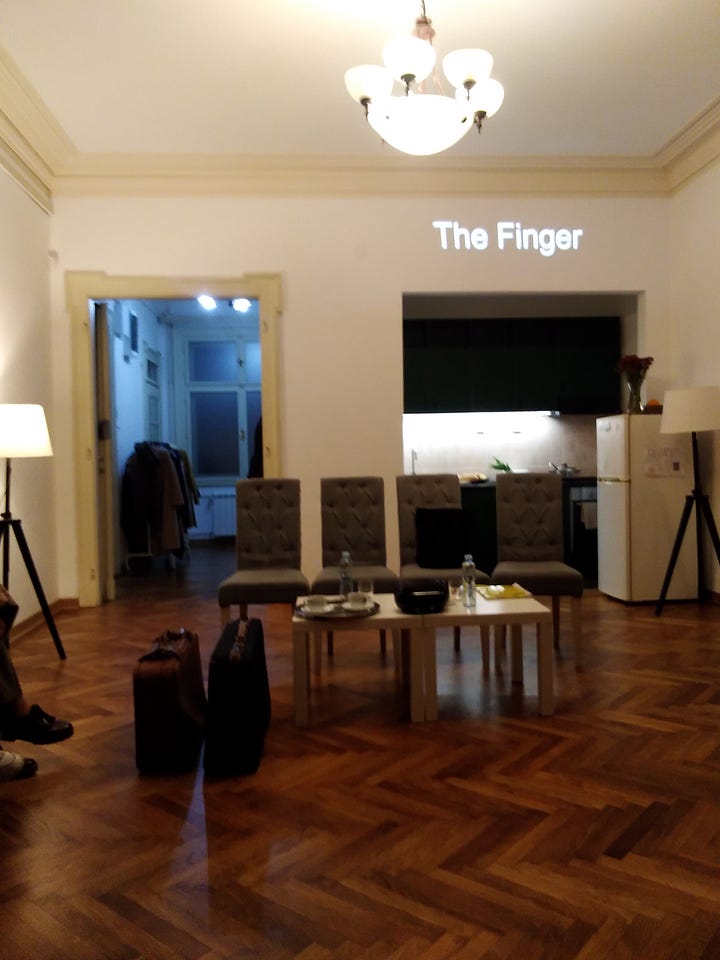
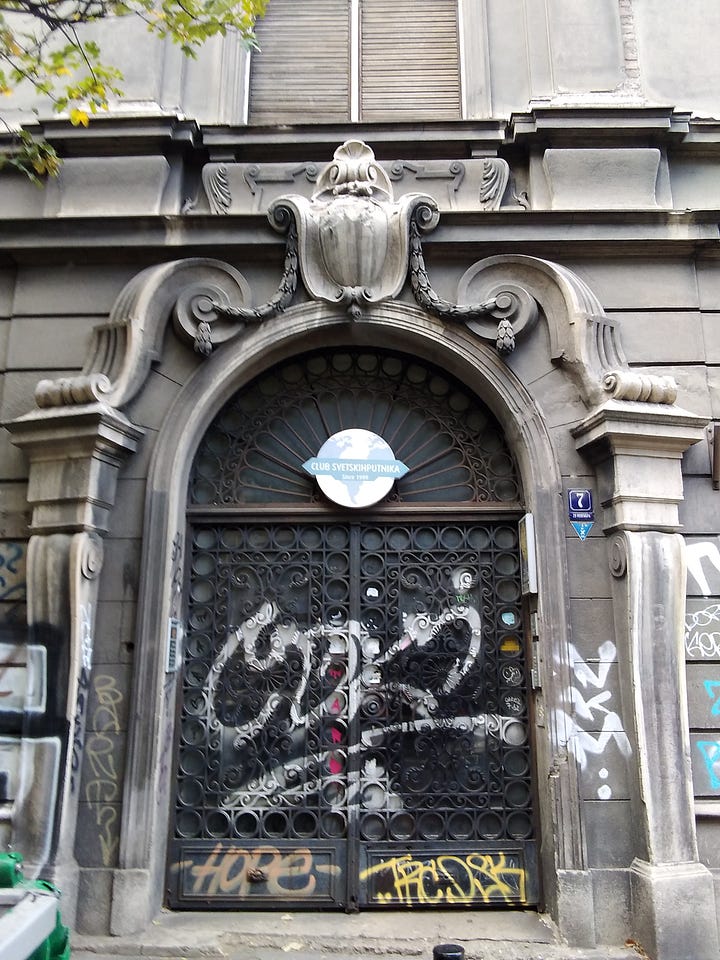
Heartefact - interrogating the past
Heatefact was founded by Andrej Nosov in 2009 with the mission of using “art to deal with tough topics from the past.” It was born out of the Youth Initiative for Human Rights which Nosovo founded as a young activist in the wake of the assassination of Serbia’s prime minister Zoran Djindjic. The initiative sought to deal with the crimes and atrocities of the past from a youth perspective. If the country was to move on, Nosov felt that a process of self-interrogation needed to be undertaken, but Serbia had, and still has, an unwillingness to engage with these topics and, in some arenas, to engage in any form of criticism is to risk being labelled a traitor.
While Heartefact’s work as an NGO embraces various Culture for Democracy projects and Kosovo-Serbia research fellowships, theatre sits at the heart of what they do.
Much of the work they programme is politically and socially engaged. Nosov cites 2011’s Hypermnesia, a documentary play directed by Selma Spahic, which explores the complex relationship between memory and the past in the people of the former Yugoslavia, as a highlight in the organisation’s early years. The following year it became the first play from Serbia after 20 years to be performed in the Kosovo National Theatre. The organisation’s response to what the media terms the ‘refugee crisis’ was 48 Hours of Awakeness, 48 hours of uninterrupted public readings of hundreds of pages of texts relating the personal stories of refugees. His own 2012 production of Martin Sherman’s Bent, one of the first explicitly gay plays to be staged in Serbia, relocated the play to contemporary Serbia, a country in which LGBTQ+ people still face harassment and discrimination.
A question Nosov is often asked by the wider theatre community in Serbia is whether he is an activist or an artist, that he needs to, in essence, pick a side, but he does not know how to divorce the two. “I don’t know how you can be a theatre maker without activism,” he told me. (You can read more about Nosov and his work in this interview, by Nick Awde for SEEstage).
“I don’t know how you can be a theatre maker without activism,” Andrej Nosov
Over the years, while they collaborated with various theatres in the region and staged work at various venues in Belgrade, there was always a sense of compromise. The Belgrade theatre scene is quite insular, he says, and there was a degree of distrust about organisations like his operating outside the institutional framework. At first he believed it was possible to change the system from the inside, but gradually he began to feel this wasn’t the case.
Last year Heartefact set about looking for their own performance space. They looked at over 100 different spaces before they found the apartment, located a stone’s throw from Skardalija, once the city’s bohemian district. The apartment itself used to host avant-garde parties in the 1980s (which some audience members themselves attended). So, its current usage is part of a cultural continuum, something which is important to Nosov. The fact that it is an apartment is important too. True political change happens inside apartments, argues Nosov, behind closed doors, and the nature of the space establishes a particular relationship with the audience. The space is called Heartefact House and the ‘house’ part is important. It is, he says, “a space where people can breathe freely.” When you go there, you’re not just going to see a show: you’re accepting an invitation.
The scent of memory
There are popcorn kiosks dotted throughout the centre of Belgrade. The toasty, old-oil smell of popcorn is one I associate with both the city and my childhood. The scent of it can transport me in time.
Popcorn plays a part in A Short History of Burgers and Other Stories, a monodrama project by Nosov performed by the Dutch actor Simon Versnel, a member of the Belgian dance troupe Peeping Tom, is another work about people being caught between the past and present. Versnel greets us at the entrance to the space, dressed in schoolboy shorts, and doling out chocolate. The older man proceeds to relate his memories of his parents, many involving the preparation and consumption of food. Our narrator recounts an incident in which he stops his mother from being arrested for shoplifting only to be punished for it. His father responds to his son’s growing interest in his mother's skirts by urging him to take up karate. Later he prepares popcorn on a small stove, repeating the same passage of judgemental dialogue – “my mother is not a whore” - over and over and as he waits for the kernels to start dancing in the pan.
The play’s key passage is of a recollection of sexual assault, which Vernel delivers while dressed in a kaftan and wig. It’s at once a scene of violation and awakening. I saw the show in the Dodona Theatre in Prishtina during the Kosovo Theatre Showcase, and even in an end-on configuration, it retained a degree of intimacy, with the performance centring on the bed. The ending of this teasing memory play is relatively low-key, a man sitting on his bed eating a burger, engaged in a private, greasy-fingered Proustian moment,
Queering the Serbian stage
Amongst their myriad other activities, Heartefact programmes the Pride Theatre Festival to coincide with Belgrade Pride and this year they announced the formation of a new theatre network that will bring together organisations that focus on queer perspectives in their work. The first organisations to join are Scensverige - Swedish Performing Arts Coalition, Slovakia’s Nomantinels, Wiener Wortstaetten from Austria, and the Istrian National Theater – City Theater Pula from Croatia.
One of Heartefact’s most significant recent productions was Patrik Lazić’s Our Son, a moving and drily amusing, semi-autobiographical play about the relationship between a young gay man and his parents. The play takes place over the course of a very awkward dinner in which the young man handles his parents’ anxieties about his sexuality. His parents (superbly played by Dragana Varagić and Aleksandar Đinđić) argue over who was to blame for his sexuality, and reprimand each other for letting him play with girls’ toys as a kid. To compound things, his mother has read a book about conversion therapy and holds out hope her son can be cured. Maybe he’d be OK if he just played a bit more football.
The conversation shifts through emotional terrain, encompassing shame, anger and hurt but also warmth. Lazić’s strength as a writer is his lightness of touch and the amount of humour the play contains. The love in the room is palpable, which makes the parents’ inability to accept their son all the more painful. The parents are not out-and-out bigots; though divorced, they maintain an amicable relationship. The play takes pains to show they are not slaves to convention, and yet they struggled to accept the fact their son for who he is. It is a barrier they cannot surmount.
Our Son also a play about agency, control – both in dramatic and personal terms - and self-protection. In a low-key way, I was reminded of Ibsen’s A Doll’s House, when it dawns on the protagonist that in order to live and love freely, he needs to make a break from his parents, to shut the door on them, if only temporarily as it is evident that no matter what he says, his parents are simply not in a place where they are ready to accept him. There is a sense that the door may be reopened at some point, but not now, not yet.
While the play has the ring of the personal, an exercise in autofiction (you can read an interview with Lazić here), it struck me that the ‘our’ of the title extends far beyond this one apartment; this conversation is no doubt one that has been played out in rooms around the Balkans and beyond.
I actually ended up seeing Our Son twice, in different contexts. The first time was at last year’s Kosovo Theatre Showcase – Heartefact regularly tours work to Kosovo and Our Son became the first Serbian show to be staged in the city of Gjilan in 23 years. I saw it for a second time at Fast Forward in Dresden (which I wrote about at length last week), where Our Son was awarded the Youth Prize by a jury of young people from the city, who gave a touching speech about how the play spoke to them. Heartefact now has plans to tour the play in the suburbs and small towns of Serbia, where it can reach an audience beyond the larger cities.
Heartefact will mark its 15th anniversary in 2024. Nosov hopes there will come a point where, in respect of the work he produces, “context and politics do not matter. But we’re not there yet.”
This week in European theatre
Each week I do a small round-up of festivals, premieres and other exciting upcoming events. If you have recommendations for this section, please do let me know.
How Goes the World – The latest in NTGent’s Histoire(s) du Théâtre series of commissions, sees Tim Etchells, founder of Forced Entertainment, reflecting on his personal history of theatre in a show in which will feature four performers and a tangle of entrances, exits and memories. The show has its world premiere in Belgium on 16th November.
Andromaque – Following his productions of Britannicus at the Comédie-Française in 2016, and Iphigénie at the Ateliers Berthier in 2020, Stéphane Braunschweig directs Racine’s tragedy set in the aftermath of the Trojan war. It premieres at the Odéon-Théâtre de l'Europe in Paris, where he is director, on 16th November.
Desiré Central Station – The 2023 edition of the international theatre festival in the northern Serbian city of Subotica includes a number of performances by the festival’s artistic director Andraš Urban alongside a programme of leading artists and directors from the region including work by Haris Pašović - featuring renowned Serbian actor Mirjana Karanović in the role of Marlene Dietrich - Jernej Lorenci and the oft-nude MandićCirkus. The festival runs from 17th -26th November.
Thanks for reading!
If you have any feedback, tips, thoughts or other comments you can reach me on natasha.tripney@gmail.com

